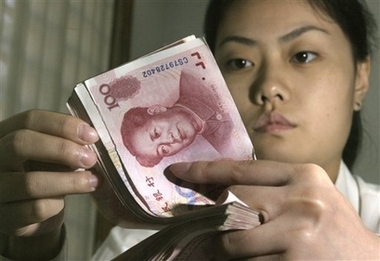The People's Bank of China,
China's central bank, will raise the deposit reserve ratio of banks, excluding
rural cooperative banks and credit cooperatives, by 0.5 percentage points from
August 15.
The hike will bring the reserves that most banks are required to deposit with
the central bank to 8.5 percent. The central bank raised the deposit reserve
ratio of banks last month by 0.5 percentage points.
|

A Chinese bank worker displays Chinese yuan at
a bank in a Beijing, China file photo from Aug. 7, 2003. A year ago this
Friday July 21, 2006, China's central bank revalued the yuan by 2.1
percent and then loosened its decade-long link to the US dollar. Since
then, the yuan has been allowed to rise a mere 1.4 percent against the
dollar, less than some currencies move in a day.
[AP]
|
"The move aims to tighten up the banks' liquidity management, curb the
excessive growth of money and credit and maintain the development of the
economy," said the central bank in a statement posted on its website.
The move comes as a surprise to many economists, who have been calling on the
central bank to raise interest rates to prevent possible overheating of the
economy through a reduction in the money available for investment.
China's economy surged 10.9 percent in the first half of 2006, the fastest in
a decade and higher than the targeted annual growth rate of eight percent set by
the government for this year.
The economy continues to roar ahead despite a slew of measures imposed by the
government to ease the blistering growth of investment.
Total investment in roads, factory equipment and other fixed assets soared
29.8 percent, an increase of 4.4 percent from the same period last year,
according to official figures released earlier this week by the National Bureau
of Statistics (NBS) .
Tang Min, chief economist with the China Mission of the Asian Development
Bank (ADB), said on Thursday he expects China to raise its interest rates soon.
"The overheating of the economy has become more and more obvious during the
first half of the year so the country needs to raise interest rates to solve the
problem," he said.
The government has vowed to slow down the surge in fixed assets investment in
some sectors troubled by overcapacity and control excessive supplies of monetary
credit but it seems very cautious to raise interest rates.
The last time the central bank adjusted interest rates was on April 27, when
it raised the benchmark one-year loan interest rate from 5.58 percent to 5.85
percent, but did not change the rate of deposits.
Analysts said a higher interest rate on deposits may help curb excessive
investment, but would also discourage consumption and investment in stock
markets, which the government has been working hard to encourage for sustainable
economic development in the long-run.